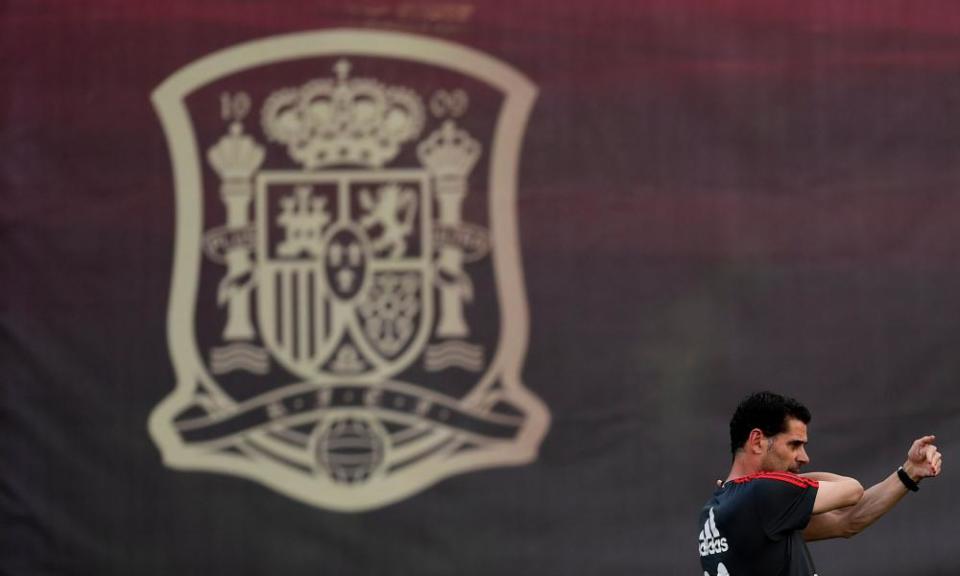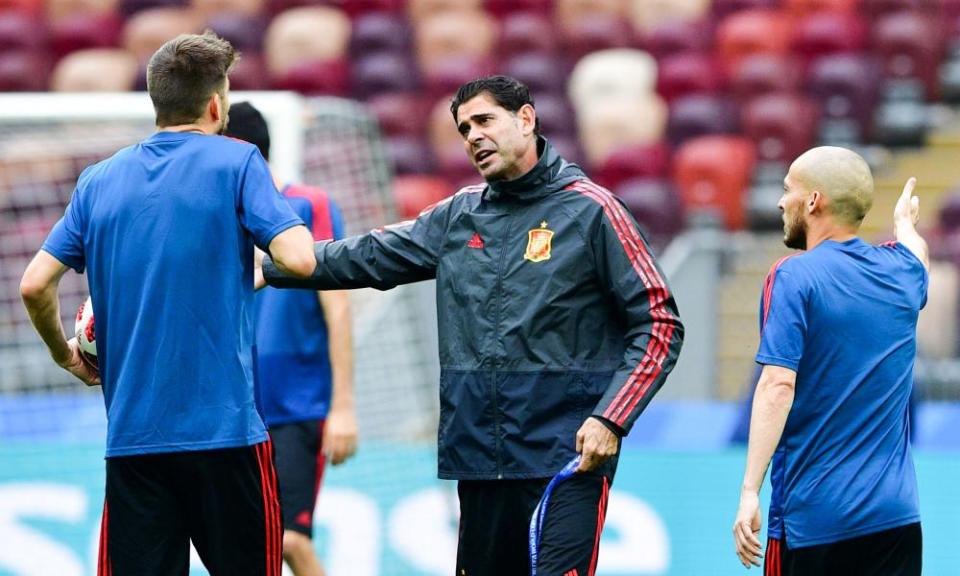Fernando Hierro – Spain’s emergency manager with a pastoral touch

The message arrived very late on the night Spain played their opening match against Portugal, so Miguel Linares did not see it until the following morning. When he looked at his phone, he says he could hardly believe it: it was from the national team manager, Fernando Hierro.
The day before Linares had announced that, out of contract at 35, he was leaving second division Real Oviedo, where he had played for four seasons. During one of them – and not an especially successful one in 2016-17 – his manager had been Hierro, who now wrote from Russia to wish him well and offer thanks for everything he had done.
“Me? I’m a pintado, a nobody,” Linares says. “He had just started as Spain manager, it’s 3am, and he’s messaging me? I looked at it: ‘I can’t believe this.’ He’s got so much going on and he thinks of me. It’s incredible. It makes your hairs stand on end.
“That tells you what kind of person he is. You get coaches who are nothing, who’ve played three Copa del Rey games – you can’t even look at them, they act like you owe them your life – and then there’s Hierro, who’s been everything in football and he thinks of everyone. His humility isn’t normal. In 20 years, I’ve never met anyone like him.”
The captain of Real Madrid, the captain of Spain, Hierro played more than 800 games. A tough, talented, imposing centre-back, he might be the finest defender Spain has produced. Twice the sporting director at the Spanish Football Federation, the director of football at Málaga, the assistant coach to Carlo Ancelotti, he has indeed been everything. Except the one thing he had just become when he messaged Linares – a manager at the highest level. His coaching career extends to that one year at Oviedo. Defeated 15 times, they finished eighth, missing the play-offs on the final day by two points.
“I am the seleccionador because of the circumstances, not my CV,” Hierro said when he stepped in after Julen Lopetegui was sacked two days before the World Cup began. He had arrived in Russia as the sporting director. In a radio interview he was asked if he would ever be Spain manager. “I’m not even contemplating it,” he replied. A day and a half later, he was Spain manager, thrust in a little reluctantly. “I came in a suit, I’ll leave in a tracksuit,” he said.
Hierro also said he would change as little as possible. That was not really his role – and at Oviedo he was not an especially interventionist coach during games. But now, as Spain prepare for a last-16 game against Russia after a knockout phase that did not entirely convince, the pressure builds. Virtually everyone is demanding change; some, a revolution. It is time, they say, for Hierro to be a manager. Few, though, really know if he really is a manager, or at least what kind.

“Oviedo was an enriching experience, fundamental for me,” Hierro said, yet when he departed, the city’s paper, La Nueva España, wrote: “There are doubts about his ability on the bench. He says he wants to be a coach and sounds convinced but his first experience has seen him stand out more in organisational and institutional questions than actually coaching.”
After Oviedo, Hierro returned to the federation as the sporting director. When it came to getting this job, it seemed he had one fundamental thing going for him: he was there. But the only players to have worked with him insist that is not fair. He was a natural choice.
“When I saw Lopetegui had been sacked, I imagined Hierro was a possibility,” says the Oviedo full-back Diego Johannesson. The Oviedo striker Toché adds: “I was delighted for him – he’s one of the best people I’ve met in football and has the capacity to succeed. He’s very intelligent and knows how to get into the players’ heads.”
Linares says: “I thought straight away: he’s the ideal person, there’s no one better. A good coach, prepared, qualified. As for the lack of experience, everyone starts somewhere.”
The former Swansea forward Michu was among Hierro’s players at Oviedo. “He was a huge figure at Madrid and with Spain, his career is impeccable, we respected him enormously and he got us to the edge of the play-offs.
“Oviedo is a difficult place. This season [when they finished seventh, missing the play-offs] showed that. Did people expect better results? Maybe. But it was not as bad as some want to make out.
“As a person, he is a gentleman from head to toes, 10/10. His group management is exceptional. You’ll find very, very few people who don’t speak highly of him.”
This is a recurring theme. The pun is inevitable: at Oviedo, some expected “mano de hierro”, which translates as an “iron fist” and also “Hierro’s hand”. Instead they got someone with what’s known as “left hand” – a more pastoral touch, vital when taking over Spain at a time of crisis, making him the perfect person according to his former players.
He visited Toché in hospital after a knee ligament injury – when no longer Oviedo manager – and Johannesson talks about a coach who would embrace everyone, someone who talked and listened, who “liked to exchange ideas, was approachable and always tried to create a good atmosphere”.
It was not just Hierro, either. With Spain he has been joined by two former Oviedo colleagues: the fitness coach, Juan Carlos Martínez, and the assistant coach, Julián Calero. “They’re a very good partnership,” Linares says of Hierro and Calero. “Julián was the leader tactically and they’d talk constantly.” Johannesson says: “Calero led sessions with Hierro adding details. They complemented each other.” Toché adds: “Calero did more tactical work with the group; one on one, Hierro is the best.”
Oviedo shifted between styles, among them 4-2‑3‑1, 4-4-2 and 4-3‑3, and there was a sense sometimes that although the details were good, they had not found an overarching idea. Linares recalls moving to the left wing and it working well. Hierro had seen something in him that, over almost 20 years, he had not seen in himself. “Tactically he talked to us about the need to close off the passing avenues inside,” Linares says. “He talked about a strong square inside, recovering positions quickly, preventing counters. That’s what Spain are struggling with. We worked on that a lot.”
Linares also says the free-kick routine from which Diego Costa scored against Portugal is one Oviedo did “a thousand times”, with David Fernández as Sergio Busquets.

How far the lessons from Oviedo can, or should, be applied to Spain is another issue. “What we did isn’t applicable to Spain and people have to understand that,” Michu says. “Oviedo is very, very, very far from there. Even a crossing and finishing drill with me, Toché, Linares is not the same as with them – they’re the best in the world.”
Toché says: “It was a very difficult year. He wanted to play from deep but reality got in the way. He had a squad that found it hard to do that, then there was a period when we conceded a lot so they wanted to close off, play more on the counterattack. With Oviedo, you might have 50% of the ball. Spain always have the ball.”
That is not about to change, for all the calls for a revolution. “You can’t change anything. He’s there on the rebound, the players are already there,” Linares says. “He’s not going to force anything and nor should he. The idea is clear. You have to manage the group.”
Stepping up was not easy but the players who have worked with him insist he is the right man for it.
“A revolution? You want the guy who took over two days before the World Cup started to start a revolution?” Michu says. “You know how you’re going to play: no one’s going to hoof it. Two days before, he wasn’t thinking of being seleccionador. It was a complicated, unexpected moment and it fell to him. He had to stand up.
“Now they’re through, in first place, on the theoretically better side of the draw. People say: ‘We were lucky, it was VAR,’ but that’s the World Cup. Spain are through, Germany aren’t for example.
“He’s been coach for a fortnight. There’s virtually no time to train tactically, you have to prepare to compete. He’s there now and he knows how to handle the pressure. It’s Russia, Putin in the directors’ box, the stadium full, Moscow but the team is good and he’s been in thousands of situations like this.
“Whatever happens, people will go mad: if he wins the World Cup, he will be the best manager in the world; if he loses, he’s a disaster. If we get there and we win it with [Iago] Aspas scoring in the 92nd minute with VAR, great.”
Linares says: “It would be a huge pleasure for all of us who know him.”

 Yahoo Sport
Yahoo Sport 





































